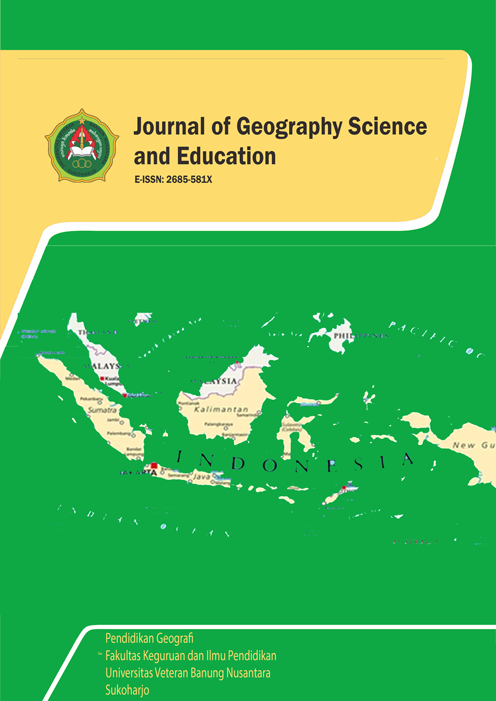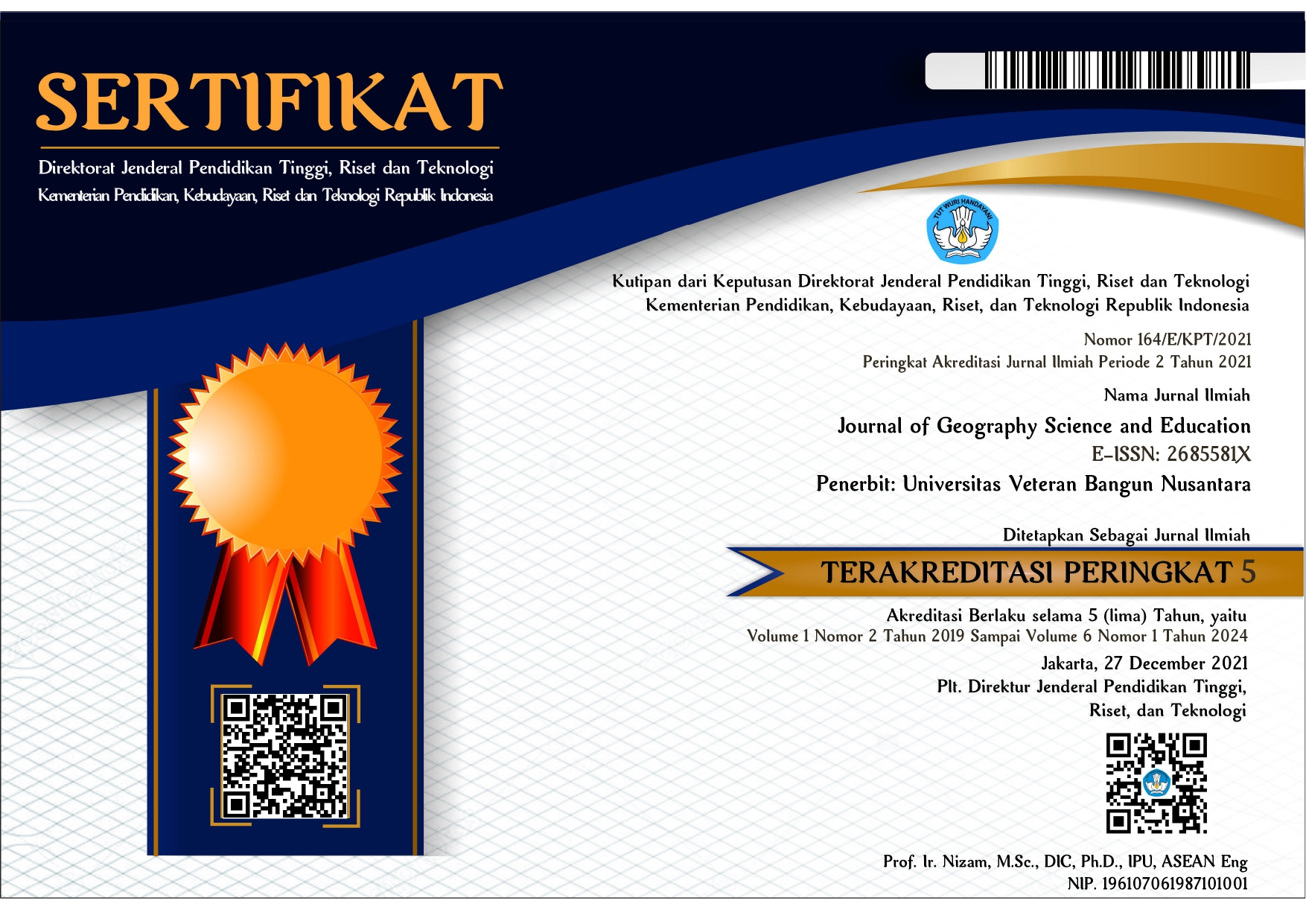Development of Kalipasang Tourism as Sustainable Ecotourism at the Kopeng Resort, Mount Merbabu National Park
DOI:
https://doi.org/10.32585/jgse.v5i1.3501Kata Kunci:
Ecotourism, Sustainable Development, Merbabu National ParkAbstrak
Kalipasang is one of the tours in the Kopeng Resort area which has the appeal of pine stands and campgrounds. This tour is part of the Kopeng Resort which is in the Mount Merbabu National Park area which has been extensively developed. However, good tourism is tourism that can boost the economy, have benefits for the community, and maintain the environment. Therefore, the purpose of this research is to find out the appropriate strategies to do so that Kalipasang tourism can be optimal as a sustainable ecotourism. The data collection method was carried out by means of field observations and interviews. The data processing method uses an analysis of the basic principles of ecotourism, IFAS and EFAS, SWOT, and sustainable ecotourism modelling. The results of this study indicate that the strategy for developing Kalipasang tourism as a sustainable ecotourism can be seen in 3 aspects, namely economic, social and environmental. From an economic aspect, it is necessary to improve facilities, carry out promotions, and make ticket prices competitive. Meanwhile, from a social aspect, it is necessary to have community participation in tourism development, efforts to educate tourists, and involve stakeholders. Meanwhile, in terms of environmental aspects, efforts to conserve plants or animals and good waste management are needed. With the combination of these three aspects, Kalipasang tourism as sustainable ecotourism can be developed.
Unduhan
Referensi
Abdullah, Z., S. S. Arifin, dan M. R. Syukri. 2021. Penatan Kawasan Wisata Torosiaje Serumpun di Kabupaten Pohuwato Dengan Pendekatan Arsitektur Ekologi. Journal of Architecture. 3(2): 33 – 43.
Adriani, Hadi, dan Nurisjah. 2016. Perencanaan Lanskap Kawasan Wisata Berkelanjutan di Kecamatan Cisarua, Kabupaten Bogor. Jurnal Lanskap Indonesia. 8(2): 53 – 69.
Asyari, A. 2018. Inventarisasi Praktik Inovatif dalam Pendidikan untuk Pembangunan Berkelanjutan. Jurnal Kajian dan Penelitian Pendidikan Islam. 12(2): 193 – 202.
Asy’ari, R., R. D. Dienaputra, A. Nugraha, R. Tahir, C. U. Rakhman, dan R. R. Putra. 2021. Kajian Konsep Ekowisata Berbasis Masyarakat Dalam Menunjang Pengembangan Pariwisata: Sebuah Studi Literatur. Pariwisata Budaya: Jurnal Ilmiah Pariwisata Agama dan Budaya. 6(1): 9 – 19.
Banjarnahor, A., R., M. S. E. Revida, S. Purba, B. Purba, J. S. Nasrullah, I. M. Murdana, E. S. Harizahayu, dan U. T. Handiman. 2021. Strategi Bisnis Pariwisata. Yayasan Kita Menulis: Medan.
Hapsoro, N. A. dan K. Bangun. 2020. Perkembangan Pembangunan Berkelanjutan Dilihat dari Aspek Ekonomi di Indonesia. Jurnal Arsitektur. 3(2): 88 – 96.
Pramono, S., I. Ahmad, dan R. I. Borman. 2020. Analisis Potensi dan Strategi Penembaan Ekowisata Daerah Penyanga Taman Nasional Way Kambas. Jurnal Teknologi dan Sistem Informasi. 1(1): 57 – 67.
Silvandi, G. O. dan S. Mandalia. 2021. Pengembangan Taman Margasatwa dan Budaya Kinantan dengan Menerapkan Aspek Pariwisata 3S (Something to see, something to do, something to buy). I-tourism. 2(2): 69 – 81.
Widiyanto, Farliana, N., dan Raeni. 2019. Pengembangan Ekowisata Berbasis Masyarakat di Pulau TIban, Desa Kartikajaya, Patebon Kendal. Seminar Nasional Kolaborasi Pengabdian Kepada Masyarakat UNDIP-UNNES 2019, 252–259.
Yonatan, D., I. P. Setiadi, dan K. B. S. Rompas. 2021. Rencana Pelarangan Penggunaan Air Tanah di DKI Jakarta: Benturan antara Kepentingan Pemerintah Dengan Hak Masyarakat. Jurnal Legislatif. 5(1): 48 – 67.
Unduhan
File Tambahan
Diterbitkan
Cara Mengutip
Terbitan
Bagian
Lisensi
License and Copyright Agreement
In submitting the manuscript to the journal, the authors certify that:
- They are authorized by their co-authors to enter into these arrangements.
- The work described has not been formally published before, except in the form of an abstract or as part of a published lecture, review, thesis, or overlay journal. Please also carefully read JGSE's Posting Your Article Policy at http://pubs2.ascee.org/index.php/ijele/about/editorialPolicies#custom-5
- That it is not under consideration for publication elsewhere,
- That its publication has been approved by all the author(s) and by the responsible authorities – tacitly or explicitly – of the institutes where the work has been carried out.
- They secure the right to reproduce any material that has already been published or copyrighted elsewhere.
- They agree to the following license and copyright agreement.
Copyright
Authors who publish with Journal of Geography Science and Education agree to the following terms:
- Authors retain copyright and grant the journal right of first publication with the work simultaneously licensed under a Creative Commons Attribution License (CC BY-SA 4.0) that allows others to share the work with an acknowledgment of the work's authorship and initial publication in this journal.
- Authors are able to enter into separate, additional contractual arrangements for the non-exclusive distribution of the journal's published version of the work (e.g., post it to an institutional repository or publish it in a book), with an acknowledgment of its initial publication in this journal.
- Authors are permitted and encouraged to post their work online (e.g., in institutional repositories or on their website) prior to and during the submission process, as it can lead to productive exchanges, as well as earlier and greater citation of published work.
Licensing for Data Publication
Journal of Geography Science and Education use a variety of waivers and licenses, that are specifically designed for and appropriate for the treatment of data:
- Open Data Commons Attribution License, http://www.opendatacommons.org/licenses/by/1.0/ (default)
- Creative Commons CC-Zero Waiver, http://creativecommons.org/publicdomain/zero/1.0/
- Open Data Commons Public Domain Dedication and Licence, http://www.opendatacommons.org/licenses/pddl/1-0/
Other data publishing licenses may be allowed as exceptions (subject to approval by the editor on a case-by-case basis) and should be justified with a written statement from the author, which will be published with the article.
Open Data and Software Publishing and Sharing
The journal strives to maximize the replicability of the research published in it. Authors are thus required to share all data, code or protocols underlying the research reported in their articles. Exceptions are permitted but have to be justified in a written public statement accompanying the article.
The associated persistent identifiers (e.g. DOI, or others) of the dataset(s) must be included in the data or software resources section of the article. Reference(s) to datasets and software should also be included in the reference list of the article with DOIs (where available). Where no domain-specific data repository exists, authors should deposit their datasets in a general repository such as ZENODO, Dryad, Dataverse, or others.
Small data may also be published as data files or packages supplementary to a research article, however, the authors should prefer in all cases a deposition in data repositories.






